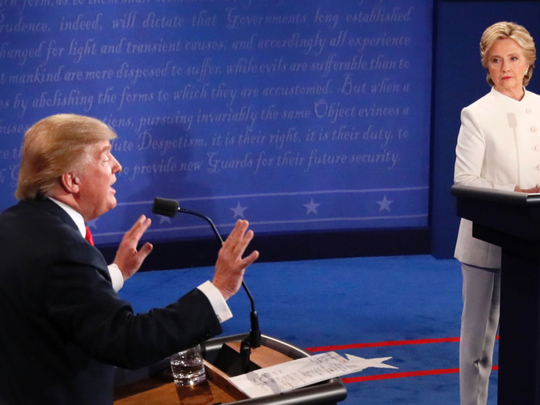
Say what you will about Donald Trump, he’s already kept one campaign promise: “I’ll keep you in suspense.”
That’s what Trump said last week when debate moderator Chris Wallace asked if he would promise to accept the result of the presidential election — a pledge Trump had made only two weeks before.
By the end of the week, the Republican nominee adopted an even more ambiguous position.
“I will totally accept the results... If I win,” he told supporters at a rally in Ohio. (He bellowed “If I win” for emphasis.) Then he added: “Of course I would accept a clear election result — but I would also reserve my right to contest or file a legal challenge in the case of a questionable result.”
There’s a pattern in Trump’s behaviour whenever he’s asked to make a promise — a pattern of coy evasiveness honed, presumably, in his years as a real estate mogul.
He pulled the same stunt a year ago when Republicans asked for a pledge to support whomever became the GOP nominee. Trump said no, then yes, then rescinded his promise. The suspense didn’t end until he won the nomination himself.
This time, though, the stakes are much higher. If Trump continues to tell his followers that the election system is “rigged” and accuses Democratic presidential candidate Hillary Clinton of stealing the White House on November 8, the result could be months of chaos and years of bitterness.
That’s why the most important news last week wasn’t Trump’s odd back-and-forth over conceding an election he hasn’t quite lost yet; it was the sharply negative reaction from many Republicans to his maneuvers — both in Congress and at the grassroots.
“A concession isn’t just an act of graciousness. It is an act of respect for the will of the American people,” said Senator John McCain (Republican from Arizona), who conceded the 2008 election to US President Barack Obama with memorable grace. Even Trump’s running mate Mike Pence said, “If the vote is fair, I’m confident that we’ll accept it.”
A poll for Politico and Morning Consult found that only 24 per cent of Trump voters think the losing candidate should challenge the results (although some of them presumably say that because they expect Clinton to lose).
That means Trump’s talk of challenging the election results is probably bluster — whether he knows it or not. If he wanted to contest the outcome — whether through litigation or a rearguard political campaign — he’d need allies. When George W. Bush and Al Gore battled over hanging chads in Florida in 2000, they both marshalled broad political support. The fight attracted teams of top-flight lawyers, many of whom worked pro bono. How many lawyers seem likely to donate their time to helping Trump argue the system is rigged?
“Rigged” is, of course, Trump’s fallback excuse for every failure. He has argued that the Emmy Awards are unfair because he never won one, and that the judicial system is rigged because a Mexican-American judge ruled against him.
Trump’s claims that the presidential election is “rigged” has further alienated him from GOP leaders already searching for the escape hatch from the trainwreck of his campaign. Republican officials in swing states such as Ohio and Florida have protested that their voting systems are entirely sound. “This isn’t helping our Senate and House candidates at all,” griped a top GOP strategist who declined to be quoted by name. “Let’s just get this election over and move on.”
It’s not clear, though, that Trump is ready to move on.
His campaign manager, Kellyanne Conway, said last week that he might refuse to concede until state-by-state results are certified, a process that takes as long as 30 days in some states. But the Electoral College will submit its votes to Congress by December 19, with or without his concession.
Trump could, as some have speculated, be laying the groundwork to turn his campaign into a permanent “grievance movement,” challenging the Republican Party leadership through a not-yet-formed cable television network. Or we could merely be witnessing a psychodrama: the process by which Trump reconciles himself to defeat.
Speaking in North Carolina Friday, he sounded as if that prospect were occurring to him for the first time.
“I don’t know what kind of shape I’m in,” he told supporters at a rally. “Win, lose or draw — and I’m almost sure if the people come out, we’re going to win — but I will be happy with myself.”
Trump has said his father taught him that there’s nothing worse than being a loser. But that’s wrong. Most Americans don’t disdain the second-place finisher in a tough contest. What they dislike, instead, is a sore loser.
— Los Angeles Times
Doyle McManus is a Washington columnist for the Los Angeles Times. He has been a foreign correspondent in the Middle East, a White House correspondent and a presidential campaign reporter









